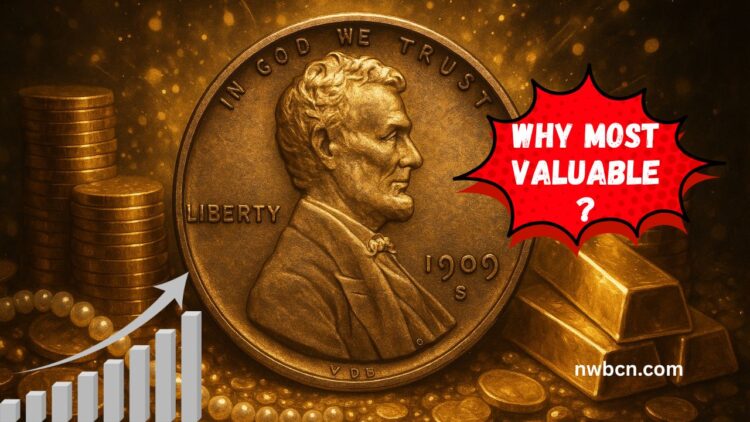The 1909‑S VDB Lincoln Wheat Penny stands unrivaled in American numismatics. Released in San Francisco with the initials of designer Victor David Brenner—VDB—on the reverse, only 484,000 were minted.
Critics deemed the initials too prominent, leading to a swift removal that same month. The result? A penny steeped in controversy, history, and value.
1909 Penny Varieties at a Glance
| Variety | Mint & Mark | Mintage | Remarks |
|---|---|---|---|
| 1909 P VDB | Philadelphia | 27,995,000 | Common initial inclusion |
| 1909 P (no VDB) | Philadelphia | 72,702,618 | Post‑removal standard version |
| 1909 S VDB | San Francisco | 484,000 | Key date, high collector demand |
| 1909 S (no VDB) | San Francisco | 1,825,000 | Standard San Francisco issue |
| 1909 P Proof VDB | Philadelphia | 1,194 | Rare proof variety |
Why the 1909‑S VDB Penny Is Legendary
1. Low Mintage, Instant Scarcity
With only 484,000 struck, it’s the lowest‑mintage business‑strike Lincoln penny—an instant rarity.
2. Historic Redesign
The 1909 penny marked the first U.S. coin featuring a president—abolishing allegorical figures. The VDB initials added a unique story that resonated with collectors.
3. Cultural Impact
Public outcry led to removal of the initials, creating two sharply defined varieties that fueled mintset completion mania and defined “key date coin” culture.
4. Collector Recognition
Ranked #14 in 100 Greatest U.S. Coins, the 1909‑S VDB is heralded as the “King” or “Holy Grail” of Lincoln cents.
Value Breakdown of 1909‑S VDB Pennies
| Condition | Estimated Value (USD) |
|---|---|
| Good‑Fine (G‑F) | $900–$1,500 |
| Very Fine (VF) | $2,000–$3,500 |
| Extremely Fine (XF) | $4,000–$6,500 |
| About Uncirculated (AU) | $8,000–$15,000 |
| Mint State (MS) 60–62 | $20,000–$50,000 |
| MS63–MS64 (Red/Bronze) | $50,000–$100,000 |
| MS65+ (Premium) | $100,000–$307,000+ |
- In 2019, a PCGS MS67 Red example sold for $307,000.
- Even well-worn VF specimens regularly fetch $2,000+.
What Fuels Its High Value?
- Low supply vs. high demand – Only 484k ever produced, far fewer survived in top grades.
- Icon of modern collecting – A must-have key date and cultural piece.
- Historical resonance – First president on a coin, controversial initials, and rushed alteration.
- Remarkable condition premiums – Upper-tier graded coins are exceedingly rare.
Survival Estimates & Collector Census
- PCGS census: Only ~11,600 graded examples across all conditions.
- Quality survivors: Few Red/Mint State coins exist; MS65+ counts in mere dozens.
Designer Spotlight – Victor David Brenner
Born in Lithuania in 1871, Brenner emigrated to the U.S., trained in Paris, and was selected by President Theodore Roosevelt to create the Lincoln cent’s iconic design. His initials on the 1909 design triggered controversy—but his artistic legacy endures.
Sales Records for 1909‑S VDB Pennies
| Auction / Sale | Grade | Price (USD) |
|---|---|---|
| Heritage 2019 | PCGS MS67 RD | $307,000 |
| Average PCGS MS65 RD (2024) | MS65 RD | ~$100,000 |
| PCGS MS60 RD rook in 2023 | MS60 RD | $40,000–$50,000 |
| VF example at Heritage show | VF | $3,000 |
| Well-worn Good condition in eBay | G-F | ~$1,000 |
Tips for Collectors & Investors
- Always buy certified coins—counterfeits abound in uncatalogued specimens.
- Red vs. Brown toning matters: Full red surfaces command premiums.
- Condition is key—even subtle wear reduces value dramatically.
- Track census and pedigree—PCGS and NGC registry sets can confirm rarity.
The 1909‑S VDB Lincoln Penny transcends its one-cent denomination. It’s a milestone of design, a flashpoint of public opinion, and a cornerstone of coin collecting.
Whether sought as a personal masterpiece or a smart investment, it remains the undisputed “most famous U.S. cent.” Its value—both historic and monetary—is unmatched.
FAQs
Q1: What makes the 1909‑S VDB penny so rare?
Only 484,000 were minted before public backlash removed “VDB”—making it the lowest-mintage business-strike Lincoln cent.
Q2: How much can a high-grade specimen be worth?
Top-tier examples in Red Mint State can reach six figures, with the highest sale exceeding $300,000.
Q3: Could I find one in circulation?
Extremely unlikely. Most survivors are catalogued and certified. Uncertified coins may be counterfeits—avoid uncertified purchases.
